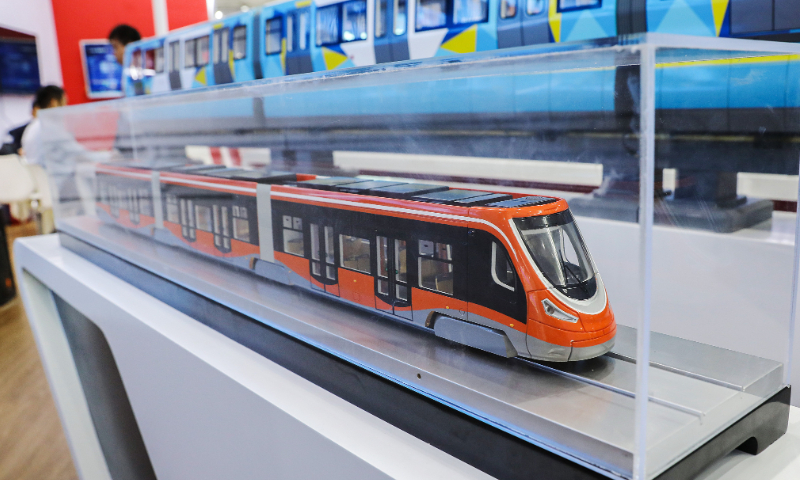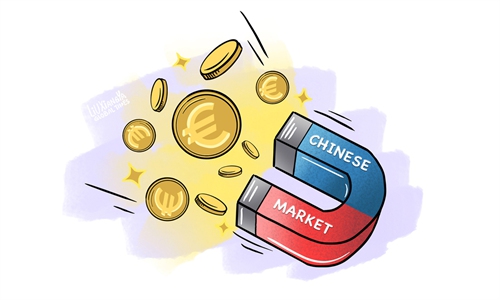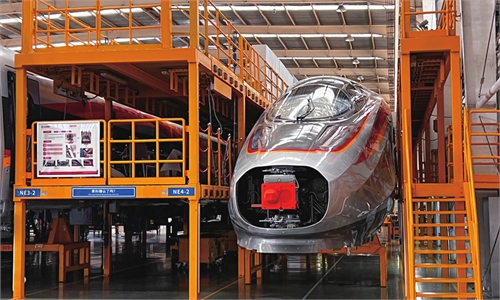Worried about a 'lose-lose'? EU should treat CRRC fairly: Global Times editorial

Model of CRRC Sifang hydrogen-powered tram is shown at the International Metro Transit Exhibition (Beijing-Qingdao) in Qingdao, East China's Shandong Province on April 28, 2023. Photo: VCG
After declaring an "unprecedented" investigation into CRRC Qingdao Sifang Locomotive Co., Ltd., a subsidiary of CRRC Corporation, on grounds of alleged subsidy distortion of the EU single market, EU officials in Munich issued a statement the following day, stating that this is a very important signal for both Europe and businesses beyond, which indicates that the EU is "absolutely willing to use" its trade tools. Prior to this, nine categories of Chinese products, including electric vehicles, had already been subject to EU anti-subsidy or anti-dumping investigations. Just last month, the EU also introduced the so-called "European Economic Security Package," which includes five categories of strengthening the EU's trade toolbox such as foreign direct investment screening and export controls, widely seen as targeting China.
With such intensive measures, it's evident that this is not solely out of the claimed intention of maintaining a trade environment that fosters fair competition. As early as last year, when the EU initiated an anti-subsidy investigation into Chinese electric vehicles, there were suspicions within the EU that the investigation was politically motivated. Looking at it now, the subjects under investigation range from the rapidly developing Chinese new energy vehicles to CRRC, which leads in both technology and market share. Media reports also suggest that leading players in solar panels, wind turbines, and other areas are being targeted. It is indeed difficult not to suspect the political factors and considerations behind this.
The "trade tool" of anti-subsidy investigations now seems to have become a tool for Europe to contain China, rushing to block any sector that shows development. We do not oppose investigations based on solid evidence and principles of transparency and fairness, aiming to create a market environment that is fair, just, and non-discriminatory. However, the actions taken by the EU seem to raise concerns of a "witch hunt." Not to mention the fact that European industries received a total of 3.8 trillion euros in subsidies from 2020 to 2022, Chinese enterprises and products enter the EU market following market rules and WTO regulations.
If the latest developments in the EU reflect any issues, it is more indicative of some Europeans' unhealthy and arrogant attitudes toward China. First, these people may genuinely believe that without subsidies and other means, China would not be able to produce such high-quality, affordable, and advanced products. Second, they are more inclined to view the mutual dependence and win-win cooperation that has developed between China and Europe over the past few decades from a more confrontational and zero-sum perspective.
Third, influenced by American "competitive" thinking, they believe that they must surpass China in order to have the right to speak and develop space. Fourth, some political elites have been contaminated by the bad practice of "making others take medicine when they are sick" in Washington, and they look for reasons for their own development difficulties from others.
In fact, the EU should have learned enough lessons from the trade war launched by the US against China, and the trade protectionism that the EU itself has also suffered from. Several European countries, including the UK, under the instigation and pressure from the US, banned Huawei's 5G equipment and technology. What were the results? The 5G industry in these countries did not develop, and the quality of 5G networks used by the people is also poor. The lessons from the past are right in front of us. The historical mistakes made by Europe have made the European people the ultimate victims. Trade openness and liberalization are the cornerstone and starting point of the EU, and they should be more loyal to economic globalization and fair competition. It must be said that some people in Europe are now going too far in adopting protectionist measures against China under the banner of "fair competition" and "economic security."
In the specific investigation against CRRC, Internal Market Commissioner Thierry Breton stated that there are sufficient indications that CRRC Qingdao Sifang Locomotive has been granted a foreign subsidy that distorts the internal market, which allowed it to "submit an unduly advantageous offer" in the tender of the Bulgarian Ministry of Transport and Communications. However, Breton did not specify what he meant by "sufficient indications." In fact, Chinese high-speed trains have long been a well-known brand worldwide, with excellent quality and competitive prices. With its own strength and cost-effectiveness, it is normal for CRRC to win the tender in Bulgaria. As the world's largest locomotive and rolling stock manufacturer, CRRC's products and services are present in more than 110 countries and regions across six continents, which is sufficient evidence in itself.
Now, the EU is forcefully intervening in this mutually beneficial project, attempting to use excessive administrative measures to push out the Chinese company that is most suitable for the project. If successful, the Chinese company will lose a major contract, Bulgaria will lose its best partner, and will have to purchase low quality products and services at a higher price. The EU will also damage its own political and commercial reputation, and the severity of the situation is clear.
The 60th Munich Security Conference has been held in Germany in these days, and reflected on the existing international order that leads to a "lose-lose" situation facing the world is one of the main focuses of the conference. How to avoid a "lose-lose" situation? Can it be avoided? It is not difficult. For example, whether the EU can treat CRRC fairly can become a vivid example. This requires a consistent attitude in words and actions, as well as overcoming self-created mental obstacles.


